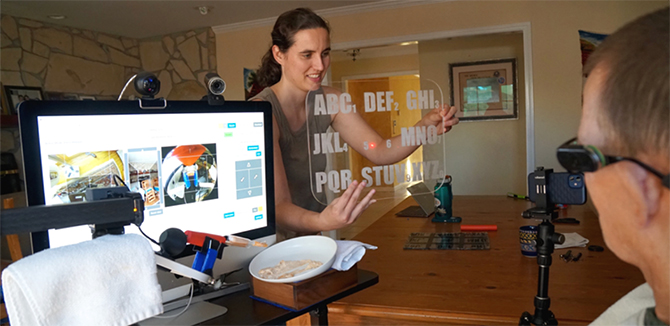A Life-Changing Internship
Anna Garverick’s summer internship leaned on her MSR lessons to help bring joy and functionality back to stroke survivor Henry Evans.

For Henry and Jane Evans, life is divided into The Before and The After.
There’s the time before the 2002 stroke, when Henry would drive the kids to school, coach their sports teams, and participate in their scouting activities.
Then there’s the time after the stroke, which initially left Henry immobile below the neck and unable to speak. Suddenly, Henry’s ability to take part in activities like family bike rides and card games with friends was gone, and Jane was thrust into the role of constant caregiver.
Anna Garverick (MSR ‘22) bore witness last summer to just how far Henry and Jane have come since that day in 2002, thanks to advancements in robotic assistance.
Garverick’s summer internship was with Hello Robot, a company founded in 2017 by the former director of robotics at Google and a professor at Georgia Institute of Technology, and supported in part by Robots for Humanity, a project Henry and Jane grew in the wake of his stroke.
Hello Robot's flagship robot is known as Stretch, and it is designed for autonomous operation. During Garverick’s internship, she helped bring new functionality to Stretch and started Henry on the road back to a hobby he enjoyed before his stroke.
“We tried a few social-oriented tasks, including playing cards with a group of friends,” she said. “After a few trial runs (Henry) was able to reliably perform the actions with the robot, and we received the best possible feedback – that it became easy to ignore the robot.”
That sort of life-changing advancement is a large part of what fuels Garverick’s love of robotics, something she discovered while in Northwestern Engineering's Master of Science in Robotics (MSR) program. It also is what drove her to seek an internship with Hello Robot for the summer before her MSR graduation.
“I gained a lot of skills in classes through individual and small group projects, but I never contributed to a large-scale project at that level,” she said. “Interning was an exciting chance to apply what I had learned.”
Apply it she did.
In addition to pushing Stretch forward with its card-playing assistance abilities, she helped give Henry the ability to switch on and off a medical device so he could pause treatment independently. Her first iteration was a step forward, but the success rate in reliably pushing the button was too low.
That’s when Henry used his existing adaptive assistance devices to open up Google Slides and sketch something he thought Garverick and the Hello Robot team should try. She was able to take his two-dimensional sketch of the button-pressing tool and used computer-aided design to imagine a three-dimensional version. She then produced the button using a 3D printer the same day Henry sketched it.
“When we tried it out with the robot, he nailed the button on the first try,” she said. “Any task we accomplished was exciting because it was often the first time Henry did it for himself in nearly two decades, but this one was particularly rewarding because the end-user was involved in designing tools based on his own experience.”
Garverick was inspired by her summer internship work and her in-class experiences so much that she decided to take a job where the end product is a robot that helps people. She now works as a robotics software engineer for Diligent Robotics, an Austin, Texas-based company that uses artificial intelligence to create robot assistants to help healthcare workers with routine tasks so they can focus more on patient care.
“Gaining hands-on experience in the MSR program made me feel well prepared for the challenge,” she said. “I am excited to be joining another small and dynamic team focused on helping people through robotics.”
Garverick said her internship would not have been successful without Professor Wendy Roger’s Human Factors and Aging Laboratory at the University of Illinois at Urbana-Champaign, Professor Maya Cakmak's Human-Centered Robotics Lab at the University of Washington, and Vy Nguyen, the occupational therapist with Hello Robot.

